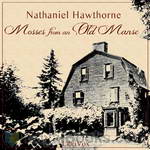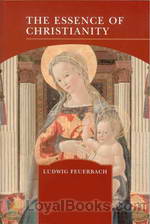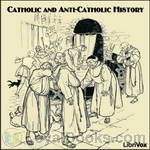|
Books Should Be Free Loyal Books Free Public Domain Audiobooks & eBook Downloads |
|
|
Books Should Be Free Loyal Books Free Public Domain Audiobooks & eBook Downloads |
|
Top Authors |
|---|
|
Book type:
Sort by:
|
By: Nathaniel Hawthorne (1804-1864) | |
|---|---|
 Mosses from an Old Manse
Mosses from an Old Manse
"Mosses from an Old Manse" is a short story collection by Nathaniel Hawthorne, first published in 1846. The collection includes several previously-published short stories and is named in honor of The Old Manse where Hawthorne and his wife lived for the first three years of their marriage. A second edition was published in 1854, which added "Feathertop," "Passages from a Relinquished Work, and "Sketches from Memory."Many of the tales collected in "Mosses from an Old Manse" are allegories and, typical of Hawthorne, focus on the negative side of human nature... | |
By: Enid Yandell | |
|---|---|
 Three Girls in a Flat
Three Girls in a Flat
Enid Yandell (October 6, 1870 - June 13, 1934) was an American sculptor who studied with Auguste Rodin and Frederick William MacMonnies. She created numerous portraits, garden pieces and small works as well as public monuments. Ms. Yandell also studied in Paris and kept a studio there. This book, Three Girls in a Flat, is a semi-autobiographical account of her work as a sculptor for the Horticultural Building at the World's Columbian Exposition in Chicago in 1893. Co-written with two friends, it's an episodic account of the trials and tribulations of three young women eking out a living while sharing a small flat in Chicago... | |
By: Peter Kropotkin (1842-1921) | |
|---|---|
 Memoirs of a Revolutionist, Vol. 1
Memoirs of a Revolutionist, Vol. 1
'Peter Kropotkin was a Russian anarcho-communist and scientist. This is his autobiography, and he writes not only about his own life, but also about 19th century Russian society and politics. He was born into the nobility and had a military education, but he gradually abandoned the values of his social class and became an anti-authoritarian socialist, opposed to both the rule of the Tsars and to the seizing of power by the authoritarian Bolsheviks. He was also interested in literature, biology, economics and geographical exploration. This first volume of his memoirs covers his childhood, his education, and the time he spent in Siberia. '. (Introduction by Elin, ) | |
By: Elisha Gray (1835-1901) | |
|---|---|
 Nature's Miracles Volume II: Energy and Vibration
Nature's Miracles Volume II: Energy and Vibration
Elisha Gray was an American electrical engineer who co-founded the Western Electric Manufacturing Company. Gray is best known for his development of a telephone prototype in 1876 in Highland Park, Illinois and is considered by some writers to be the true inventor of the variable resistance telephone, despite losing out to Alexander Graham Bell for the telephone patent.Nature’s Miracles: Familiar Talks on Science, published in 1900, is a discussion of science and technology for the general public. Volume II is subtitled Energy and Vibration: Energy, Sound, Heat, Light, Explosives. | |
By: Plato (426-347 BCE) | |
|---|---|
 Meno
Meno
Meno (Ancient Greek: Μένων) is a Socratic dialogue written by Plato. Written in the Socratic dialectic style, it attempts to determine the definition of virtue, or arete, meaning in this case virtue in general, rather than particular virtues, such as justice or temperance. The goal is a common definition that applies equally to all particular virtues. Socrates moves the discussion past the philosophical confusion, or aporia, created by Meno's paradox (aka the learner's paradox) with the introduction of new Platonic ideas: the theory of knowledge as recollection, anamnesis, and in the final lines a movement towards Platonic idealism.. (Introduction by Wikipedia) | |
By: Saint Francis de Sales (1567-1622) | |
|---|---|
 Of the Love of God
Of the Love of God
Francis de Sales (1567-1622), Bishop of Geneva from 1602, was a renowned spiritual director who produced two classic guidebooks for earthly wayfarers on their spiritual journey to God: Introduction a la vie devote (Introduction to the Devout Life, 1609) and Traite' de l'amour de Dieu (Treatise on the Love of God, or Of the Love of God, 1616). In the Introduction to the Devout Life, Francis shows how anyone, whatever his or her calling or station in life, can strive for and achieve a life a piety and devotion to God... | |
By: Howard Pyle (1853-1911) | |
|---|---|
 Twilight Land
Twilight Land
The room was all full of twilight; but there they sat, every one of them. I did not count them, but there were ever so many: Aladdin, and Ali Baba, and Fortunatis, and Jack-the-Giant-Killer, and Doctor Faustus, and Bidpai, and Cinderella, and Patient Grizzle, and the Soldier who cheated the Devil, and St. George, and Hans in Luck, who traded and traded his lump of gold until he had only an empty churn to show for it; and there was Sindbad the Sailor, and the Tailor who killed seven flies at a blow,... | |
By: Theodore Dreiser (1871-1945) | |
|---|---|
 The Titan
The Titan
Cowperwood moves to Chicago with his new wife Aileen. He decides to take over the street-railway system. He bankrupts several opponents with the help of John J. McKenty and other political allies. Meanwhile, Chicago society finds out about his past in Philadelphia and the couple are no longer invited to dinner parties; after a while, the press turns on him too. Cowperwood is unfaithful many times. Aileen finds out about a certain Rita and beats her up. She gives up on him and has an affair with Polk Lynde, a man of privilege; she eventually loses faith in him... | |
By: Max Stirner (1806-1856) | |
|---|---|
 The Ego and His Own
The Ego and His Own
In this book, his most famous, Max Stirner presents a philosophical case for a radical egoism that shuns the socially-oriented outlooks of both "establishment" ideologies and of revolutionaries in favor of an extreme individualism. The book is most widely talked about today only through the lens of other philosophers' thought: Karl Marx and Friedrich Engels launched a famous assault on it in The German Ideology, and some draw a connection between Stirner's thoughts here and Nietzsche's egoism a generation later. But it is worth reading in its own right, as much for its lyricism as the challenge of its philosophical proposals. | |
By: St. John Chrysostom (349-407) | |
|---|---|
 Commentary on Galatians
Commentary on Galatians
St. Chrysostom’s Commentary on the Epistle to the Galatians is continuous, according to chapter and verse, instead of being arranged in Homilies, with a moral or practical application at their close, as in his exposition of other Epistles. It was written in Antioch, as Montfaucon infers from a reference which the Author, makes upon Chap. i., ver. 16 to other of his writings, which certainly were written about the same time in that city. (Introduction from the preface by John Henry Newman) | |
By: Hermann Gunkel | |
|---|---|
 The Legends of Genesis
The Legends of Genesis
The Legends of Genesis is the English translation of the introduction to Gunkel’s massive commentary, Genesis. Gunkel uses form critical analysis on the text of Genesis to determine the various genres of the biblical legends and their significance to the authors. Gunkel also uses form criticism to uncover buried clues as to the constituent sources of the text. Gunkel offers his hypothesis to explain how the various sources came to be combined and redacted, and how the text later came to be attributed to Moses. | |
By: William Shakespeare (1564-1616) | |
|---|---|
 Venus and Adonis
Venus and Adonis
Venus and Adonis is Shakespeare's narrative poem about the love of the goddess Venus for the mortal youth Adonis, dedicated partly to his patron, the Earl of Southampton (thought by some to be the beautiful youth to which many of the Sonnets are addressed). The poem recounts Venus' attempts to woo Adonis, their passionate coupling, and Adonis' rejection of the goddess, to which she responds with jealousy, with tragic results. This recording features three different readers performing the narration, Venus, and Adonis. | |
By: Various | |
|---|---|
 One-Act Play Collection 002
One-Act Play Collection 002
This collection of eight one-act dramas features plays by Eugene O'Neill, George Bernard Shaw, John Galsworthy, Susan Glaspell, William Dean Howells and John Millington Synge. It also includes a dramatic reading of a short story by Frank Richard Stockton. | |
By: Barry Pain (1864-1928) | |
|---|---|
 Eliza
Eliza
A gentle, yet deliciously humourous series of anecdotes following the life of the main character and his wife, Eliza. | |
By: Justin McCarthy (1830-1912) | |
|---|---|
 The Riddle Ring
The Riddle Ring
This romantic mystery - or mysterious romance - tells the tale of jilted lover, Jim Conrad, who discovers an unusual gold ring while on a visit to Paris. What is the story of the ring? Why is Clelia Vine so sad? Who is the nameless 'chief'? And how is a dour English barber in a Parisian salon mixed up in all this?The novel, published in 1896, was written by Justin McCarthy, an Irish nationalist, Liberal historian, novelist and politician. (Introduction by Ruth Golding) | |
By: Fyodor Dostoyevsky (1821-1881) | |
|---|---|
 The Grand Inquisitor (dramatic reading)
The Grand Inquisitor (dramatic reading)
The Grand Inquisitor is a parable told by Ivan to Alyosha in Fyodor Dostoevsky's novel The Brothers Karamazov (1879–1880). Ivan and Alyosha are brothers; Ivan questions the possibility of a personal, benevolent God and Alyosha is a novice monk. The Grand Inquisitor is an important part of the novel and one of the best-known passages in modern literature because of its ideas about human nature and freedom, and because of its fundamental ambiguity. In the tale, Christ comes back to earth in Seville at the time of the Inquisition... | |
By: Anonymous | |
|---|---|
 True Stories of Wonderful Deeds
True Stories of Wonderful Deeds
37 short pieces perfect for newer recorders. These one page Stories of (mostly) Wonderful Deeds were written for Little Folk to teach them about famous incidents in their history. Bonnie Prince Charlie, Nelson and Hardy, Bruce and the Spider, David Livingston, Canute, Sir Philip Sydney, and Elizabeth and Raleigh are just some of the well known people and incidents covered in short stories. | |
By: Richard Marsh (1857-1915) | |
|---|---|
 Amusement Only
Amusement Only
This is a collection of 12 short stories of mystery and humor, which are, as the title says, for amusement only. | |
By: John Lang (1816-1864) | |
|---|---|
 Gulliver's Travels, Told to the Children
Gulliver's Travels, Told to the Children
This is a children's version of Jonathan Swift's novel Gulliver's Travels, from the Told to the Children Series (published in 1910). The children's adventure story covers Gulliver's visits to the lands of Lilliput and Brobdingnag. | |
By: Unknown | |
|---|---|
 Three Ecumenical Creeds
Three Ecumenical Creeds
MANUAL OF SURGERY, OXFORD MEDICAL PUBLICATIONSBY ALEXIS THOMSON, F.R.C.S.Ed.PREFACE TO SIXTH EDITION Much has happened since this Manual was last revised, and many surgical lessons have been learned in the hard school of war. Some may yet have to be unlearned, and others have but little bearing on the problems presented to the civilian surgeon. Save in its broadest principles, the surgery of warfare is a thing apart from the general surgery of civil life, and the exhaustive literature now available on every aspect of it makes it unnecessary that it should receive detailed consideration in a manual for students... | |
By: Maurice Leblanc (1864-1941) | |
|---|---|
 The Crystal Stopper
The Crystal Stopper
During a burglary at the home of Deputy Daubrecq a crime is committed, and two accomplices of Arsène Lupin are arrested by the police. One is guilty of the crime, the other innocent, but both will be sentenced to death. Lupin seeks to deliver the victim of a miscarriage of justice, but struggles against Deputy Daubrecq's ruthless blackmailer, who has an incriminating document hidden in a crystal stopper. | |
By: A. A. Milne (1882-1956) | |
|---|---|
 The Sunny Side
The Sunny Side
The Sunny Side is a collection of short stories and essays by A. A. Milne. Though Milne is best known for his classic children's books, especially Winnie The Pooh, he also wrote extensively for adults, most notably in Punch, to which he was a contributor and later Assistant Editor. The Sunny Side collects his columns for Punch, which include poems, essays and short stories, from 1912 to 1920. Wry, often satirical and always amusingly written, these pieces poke fun at topics from writing plays to lying about birdwatching. They vary greatly in length so there is something for everyone. | |
By: May Gillington Byron (-1936) | |
|---|---|
 Days with the Great Composers
Days with the Great Composers
These light entertainments, originally published anonymously, are an imagined day in the life of each composer (Beethoven, Mendelssohn, Schubert, Chopin, Wagner, Gounod, Mozart, Schumann, Tschaikovsky). This gives the author scope to describe each one's work and life, sketchily, of course, but interestingly. | |
By: Ludwig Feuerbach (1804-1872) | |
|---|---|
 The Essence of Christianity
The Essence of Christianity
Taking issue with Hegel’s sense that God, as Logos, is somehow central to all that is, Feuerbach explores his own notion that Christianity, as religion, grew quite naturally from ordinary human observation. Only upon deeper, systematic reflection did people postulate a divine source–God. Religious teaching which loses sight of its own essential rootedness in human experience runs the risk becoming overly abstract, disconnected even, from realities which shape humanity and which impart meaning and dignity to life... | |
By: Camille Flammarion (1842-1925) | |
|---|---|
 Omega: The Last Days of the World
Omega: The Last Days of the World
Omega: The Last Days of the World is a science fiction novel by astronomer Camille Flammarion. On 25th century Earth, a comet is on a path to collide with the Earth ending it all. Astronomers predict different scenarios as to how they will all die depending on the chemical composition of the comet. Omega probes the philosophical and political consequences that arise as the human race faces the end of the world. | |
By: Martin Luther (1483-1546) | |
|---|---|
 The Bondage of the Will
The Bondage of the Will
On the Bondage of the Will (Latin: 'De Servo Arbitrio', literally, "On Un-free Will", or "Concerning Bound Choice"), by Martin Luther, was published in December 1525. It was his reply to Desiderius Erasmus's De libero arbitrio diatribe sive collatio or On Free Will, which had appeared in September 1524 as Erasmus's first public attack on Luther, after being wary about the methods of the reformer for many years. At issue was whether human beings, after the Fall of Man, are free to choose good or evil. The debate between Luther and Erasmus is one of the earliest of the Reformation over the issue of free will and predestination. | |
By: Pierre Loti (1850-1923) | |
|---|---|
 War
War
Pierre Loti [Julien Viaud] (1850-1923) was a French naval officer and novelist. The present book is one of his few works of non-fiction, a small collection of letters and diary entries that describe his views and experiences in the wars and military operations in which he participated. Besides World War I, he also sheds light upon his views and involvement in the preparations for the Turkish Revolution of 1923, for which until today a famous hill and popular café in Istanbul are named after him. | |
By: Mark Twain (1835-1910) | |
|---|---|
 Old times on the Mississippi
Old times on the Mississippi
Old Times on the Mississippi is a non-fiction work by Mark Twain. It was published in 1876. Originally published in serial form in the Atlantic Monthly, in 1875, this same work was published as chapters 4 through 17 in Twain's later work, Life on the Mississippi (1883). Old Times on the the Mississippi has one last chapter that has nothing to do with the rest of the book. A Literary Nightmare describes the funny/sad/maddening effect that a catchy jingle can have on those unlucky enough to be captured by one. | |
By: Andrew Murray (1828-1917) | |
|---|---|
 The Lord's Table
The Lord's Table
Murray suggests that his devotional, The Lord's Table, is not meant to replace scripture, but rather to strengthen believers' appreciation of God's word. Murray's meditations provide a thoughtful guide for believers who desire to develop a deeper understanding of the Lord's Holy Supper. The devotional covers the week before, during, and after the Supper, and each entry is labeled with the day of the week so that readers can manage devotions with ease. Murray first explains how believers can prepare to receive God's blessing during the weeks before the Supper... | |
By: Various | |
|---|---|
 Catholic and Anti-Catholic History
Catholic and Anti-Catholic History
G.K. Chesterton and James Walsh join Hilaire Belloc in an energetic rollout of the means by which history becomes propaganda, to the damage, not only to truth, but to the human soul. | |
By: Henrik Ibsen (1828-1906) | |
|---|---|
 The Wild Duck
The Wild Duck
The Wild Duck (1884) (original Norwegian title: Vildanden) is by many considered Ibsen's finest work, and it is certainly the most complex. It tells the story of Gregers Werle, a young man who returns to his hometown after an extended exile and is reunited with his boyhood friend Hjalmar Ekdal. Over the course of the play, the many secrets that lie behind the Ekdals' apparently happy home are revealed to Gregers, who insists on pursuing the absolute truth, or the "Summons of the Ideal". Among these truths: Gregers' father impregnated his servant Gina, then married her off to Hjalmar to legitimize the child... | |
By: Benjamin Harris (1781-1858) | |
|---|---|
 The Recollections of Rifleman Harris
The Recollections of Rifleman Harris
The recollections of a British infantryman who served in the British army during the Napoleonic Wars. | |